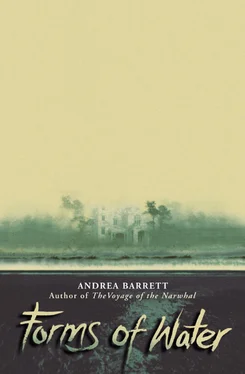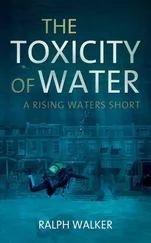“But they’re not here,” Waldo said. “It doesn’t look like anyone’s in the van.”
They climbed out of the car and looked around. A trail entered the woods and ran up the hill, and Waldo looked at the map the woman had given them and said, “I think your uncle’s land is up there.”
Wiloma looked into the trees. Her uncle’s land — and near it, touching it, must be her father’s land and the cabin in which she’d been born. She leaned back against the Saab, momentarily unable to breathe. She remembered this land, she remembered everything about it. The cabin sat high on the ridge back along its length, and in the winter the water had been visible through the leafless trees. A narrow path ran down from the ridge, through the flatter land to the shore, and where the shore jutted out in a small point there was an old wood dock on which she and her mother and Henry had sat. There were turtles under the dock. There were small silvery fish that swam in schools. In the woods there were violets and larger flowers her father had named for her when he’d come home: lady’s slippers, columbines. The trees were dotted with oval woodpecker holes.
Waldo walked over and put his arm around her waist. “You okay?”
She struggled to speak. “It’s just … It’s just …”
“I know. It’s beautiful here. No matter what happens, you shouldn’t sell this. It’s your family’s home.”
This surprised her so much that the tightness eased in her chest. “I know,” she said. “I know every inch of this place — I know just what it looks like up there. But I didn’t expect you to realize what it means to me.”
He shrugged and picked at some mud that had dried on the car. “I’m not such an asshole. Not all the time.”
“Why did you drive me here?”
“You seemed like you needed some help,” he said, but then he dropped his eyes. “Okay, I was maybe a little interested in this place, what you and Henry were planning to do with it, and I was thinking maybe there was a way I could be a part of whatever you did. And also I was afraid maybe you’d want to give your share to that church of yours, and I wanted to keep you from doing anything foolish. The kids ought to get this someday, not some group of fanatics.”
She let that last comment pass. “I’d never give this away. This is important.”
“So was the place in Coreopsis,” Waldo said quietly.
“I didn’t give that to anyone,” she snapped. “I let Henry use it. How was I supposed to know …” She sighed. “You’re right. That was a mistake.”
“That’s all I wanted — to be sure you didn’t make another.”
She moved away from his arm, fighting the urge to lean into him. “You don’t need to worry. I’m not as stupid as you think.” There were lines on the ground near the van, she saw — parallel lines like the tracks of snakes.
“Look,” she said. They walked over and inspected the tracks, which led from the van to the gate and then vanished.
“Brendan’s wheelchair?” Waldo asked.
“Must be.” She patted her hair and tried to gather herself together. The entire secret to life, she remembered from her Manual, is not to be distracted. Focus on what’s important. “Let’s go.”
But above them, in the distance, they heard whistling. Just a few notes, the fragments of a tune — loud, broken, cheerful. “What’s that?” Waldo said.
Wiloma looked up and behind them. She couldn’t see anyone, but she would have known that whistle anywhere — that was Henry, who let out unconscious peeps and chirps when he was happy and thought he was alone. He had done that even as a little boy, when he’d been all she had to cling to.
“Henry’s up there,” she told Waldo. “That’s his whistle. He must have Uncle Brendan with him.”
“There’s no way. You couldn’t get a wheelchair up that path. And anyway, these have to be Brendan’s tracks.”
“Maybe so. But that’s Henry up there.”
Waldo looked up the hill and down the road. “Here’s what we’ll do. I’ll go find Henry. You follow the wheelchair tracks and find your uncle. We’ll meet back here. Okay?”
“Okay,” Wiloma said, although the idea of being separated dismayed her. She watched Waldo vanish into the trees, and then she turned down the road and walked past the gate.
The road was rough, dotted with puddles and rocks. The snakelike tracks vanished and then reappeared and then vanished again. A flicker flew past with a whir of wings, and a flock of chickadees rose from a witch hazel at her approach. She walked quickly, intently, trying to focus on her uncle, and she was rewarded when she came around a curve. The trees thinned and then stopped abruptly at the edge of a clearing, and in the distance, where the clearing opened onto a pebbly bit of beach, she saw her uncle next to a man who was pushing a rowboat into the water. A dock stood nearby, and a shed next to a group of other boats. She supposed this was a place from which fishermen set out. A dog pranced between Brendan and the man putting in the boat, and she thought she recognized it as Bongo.
She opened her mouth to call out to her uncle, but a noise distracted her. Behind her, from the ridge, she thought she heard voices calling, and she turned and ran her eyes along the trees. From this clearing — oh, she remembered this, remembered how she’d been able to look up from here and see the cabin winking through the forest — she could see the whole length of the ridge, angling back from the reservoir. She saw the trail carved along the top, and a flash of blue she knew to be Waldo’s shirt. That was Waldo yelling, calling her — or perhaps he was calling Henry. That flash of white, there, farther out along the ridge — was that Henry?
She waved her arms over her head, hoping to attract the attention of one or both of them. She heard more shouting — Henry? Waldo?
“ … doing here?” she thought she heard, and then “What?” She strained her eyes and ears. That blue flash was Waldo, moving very quickly now, and the white flash standing still was Henry. And they were not, either of them, calling to her. They were shouting at each other.
She closed her eyes for a second. “Idiot!” she heard.
The word carried down the ridge and across the clearing to her, but she couldn’t tell who had yelled it and she turned her back on both men. They were hopeless, useless. She took three cleansing breaths and fixed her eyes on the place where her uncle sat. Then she squeezed her eyes shut and opened them again. The wheelchair was empty, outlined against the reservoir and the floating green islands, and from the point across the small cove to her left she thought she heard still other voices calling. The rowboat drifting away from the shore had two men in it, and a dog.
IT WASN’T EASY, GETTING INTO THE BOAT; AT FIRST, BRENDAN had thought they’d never manage it. Marcus had tugged Brendan out of his wheelchair easily enough — that was simple, that was only a guided fall — but the boat’s lip had seemed insurmountable until Marcus, his hands under Brendan’s armpits, had looked up and said, “Say — we have company. Maybe we can get that woman to help.”
Brendan had recognized Wiloma emerging from the trees, and as he did, the vague wish he’d formed to set out on the water, the half-joking suggestion Marcus had made that they borrow one of the boats and go for a row, had crystallized into a fierce desire. He couldn’t imagine how Wiloma had followed him here, but he knew her presence meant the end of his adventure and he wasn’t ready to go back. Not to St. Benedict’s; not, particularly not, to whatever strange ceremonies Wiloma had planned at her house. He had seized the side of the boat in his hands and, with a strength he hadn’t had in years, hauled his torso in. Marcus, who acted as if this were a lark and they were still boys, had laughed and flopped Brendan’s legs over the side and then eased Brendan’s crumpled form onto the seat in the stern. Then he’d stepped in himself and pushed the boat away from the shore. At the last instant Bongo had slipped in, wet and dripping, and now he sat on the floor between Brendan and Marcus, his toenails scrabbling with each movement of the boat.
Читать дальше












